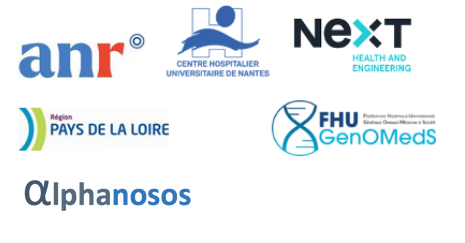Developmental disorders
Frédéric Ebstein
Investigators: Stéphane Bézieau, Frédéric Ebstein, Sébastien Küry, Bertrand Isidor, Sandra Mercier, Benjamin Cogné
Associated investigators: Wallid Deb, Thomas Besnard, Mathilde Nizon, Marie Vincent
PhD Student : Marielle Oloude
Support staff: Lise Bray, Léa Poirier, Yann Verrès
Our research team brings together clinical geneticists, researchers and biologists, united by a primary focus on developmental diseases with a particular emphasis on neurodevelopmental disorders, which constitute the primary reason for genetic consultation. Over the past decade, we have successfully identified numerous genes associated with rare genetic conditions, using high-throughput exome or genome sequencing approaches. Recently, we have also integrated transcriptomic approaches into our methodology. Through collaborative investigations on international patient cohorts, we have established genotype-phenotype correlations, significantly advancing our understanding of rare genetic diseases. This effort allowed us to unveil a new category of neurodevelopmental disorders termed ‘neurodevelopmental proteasomopathies’.
Neurodevelopmental proteasomopathies are congenital disorders primarily characterized by impaired neurodevelopment, resulting in manifestations such as speech delay, intellectual disability, motor delay, and behavioral challenges. These disorders stem from alterations in genes related to the proteasome, a multi-subunit protease complex responsible for regulating protein homeostasis within the cell. Over the past five years, our group has made substantial contributions to understanding these disorders, pinpointing three of the four known disease-causing genes. Notably, individuals affected by neurodevelopmental proteasomopathies often exhibit malformations in multiple organ systems, including the face, heart, kidney, skeletal system, and ear. This suggests that proteasome loss-of-function variants primarily impact embryonic precursors involved in the development of cerebral, cardiac, renal, and auditory structures.
Our objective is to assess the influence of proteasome pathogenic variants on the ability of induced pluripotent stem cells (iPSCs) to differentiate into neuronal, craniofacial, and cardiac cellular derivatives and organoids. Our immediate focus is on exploring the transcriptomes, proteomes, and dynamics of proteasome variants in these model systems. Preliminary results indicate that proteasome dysfunction can also be observed in developmental pathologies without neurodevelopmental abnormalities. Some rare genetic diseases are being explored in this context within the team.
Learn more about our projects
- EJP RD UPS-NDDiag - Sébastien Küry (2023-2026)
- Mutuelles AXA TND-UPS - Stéphane Bézieau (2023-2026)
- ANR UPS-NDDecipher - Sébastien Küry (2022-2025)
- NExT NDD-UBIPRO - Frédéric Ebstein (2022-2025)
Understanding neurodevelopmental proteasomopathies as new rare disease entities: A review of current concepts, molecular biomarkers, and perspectives. S. Cuinat, S. Bézieau, W. Deb, S. Mercier, V. Vignard, B. Isidor, S. Küry, F. Ebstein. Genes Dis (in press)
Neurodevelopmental disorders (NDD) caused by genomic alterations of the ubiquitin-proteasome system (UPS): the possible contribution of immune dysregulation to disease pathogenesis. F. Ebstein, S. Küry, J.J Papendorf and E. Krüger. Front Mol Neurosci (2021) Sep
Stankiewicz-Isidor syndrome: expanding the clinical and molecular phenotype. B. Isidor, F. Ebstein, A. Hurst, M. Vincent, I. Bader, N.L. Rudy, B. Cogne, J. Mayr, A. Brehm, C. Bupp, K. Warren, C.A. Bacino, A. Gerard, J.D. Ranells, K.A. Metcalfe, Y. van Bever, Y.H. Jiang, B.A. Mendelssohn, H. Cope, J.A. Rosenfeld Mokry, P.R. Blackburn, M.L. Goodenberger, H.M. Kearney, J. Kennedy, I. Scurr, K. Szczaluba, R. Ploski, A. de Saint Martin, Y. Alembik, A. Piton, A.L. Bruel, C. Thauvin, A. Strong, K.E.M. Diderich, D. Bourgeois, K. Dahan, V. Vignard, D. Bonneau, E. Colin, M. Barth, C. Camby, G. Baujat, I. Briceño, A. Gomez, W. Deb, S. Conrad, T. Besnard, S. Bézieau, E. Krüger, S. Küry and P. Stankiewicz. Genet Med (2022) Jan;24
De novo disruption of the proteasome regulatory subunit PSMD12 causes a syndromic neurodevelopmental disorder. S. Küry, T. Besnard, F. Ebstein, T.N. Khan, T. Gambin, J. Douglas, C.A. Bacino, S. Sanders, K. Stringer, X. Latypova, K. Khan, M. Pacault, S. Sacharow, K. Glaser, E. Bieth, L. Perrin-Sabourin, M.L. Jacquemont, M.T. Cho, E. Roeder, A.S. Denommé, K.G. Monaghan, B. Yuan, F. Xia, S. Simon, D. Bonneau, P. Parent, B. Gilbert-Dussardier, S. Odent, A. Toutain, L. Pasquier, C.A. Shaw, A. Patel, J.L. Smith, W. Bi, S. Schmitt, W. Deb, M. Nizon, S. Mercier, M. Vincent, C. Rooryck, V. Malan, I. Briceño, A. Gomez, K. Nugent, J.B. Gibson, B. Cogné, J.R. Lupski, H.A.F. Stessman, E. Eichler, K. Retterer, Y. Yang, R. Redon, N. Katsanis, J.A. Rosenfeld, P.M. Kloetzel, C. Golzio, S. Bézieau, P. Stankiewicz* and B. Isidor*. Am J Hum Genet (2017) Feb
Funding
- ALPHANOSOS
- Agence nationale de la Recherce
- CHU de Nantes
- FHU GenOMedS
- NExT
- Région Pays de la Loire






